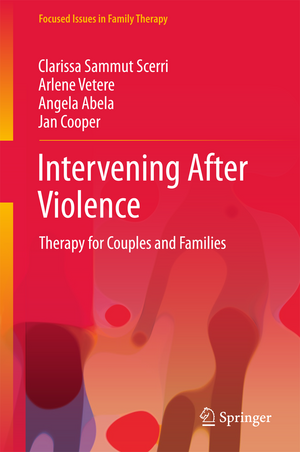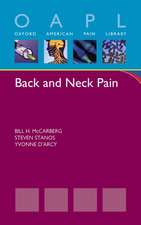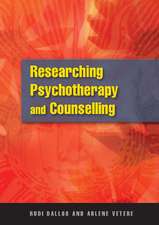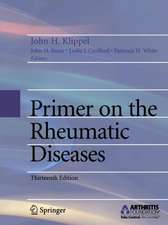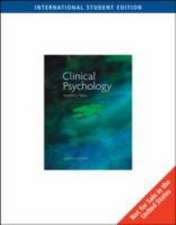Intervening After Violence: Therapy for Couples and Families: Focused Issues in Family Therapy
Autor Clarissa Sammut Scerri, Arlene Vetere, Angela Abela, Jan Cooperen Limba Engleză Hardback – 8 aug 2017
Among the topics covered:
· Living with violence in the family: retrospective recall of women’s childhood experiences.
· How to help stop the violence: using a safety methodology across the life span.
· Helping couples separate safely: working towards safe separations. · Healing and repair in relationships: working therapeutically with couples.
· Working systemically with parents, children, and adult survivors when the abuse stops. · Supervision and consultation with practitioners who intervene with families and trauma.
Intervening After Violence: Therapy for Couples and Families is an essential resource for social workers and mental health professionals engaged in clinical practice seeking strategies for working therapeutically and systematically with couples and families coping with physical and emotional violence.
| Toate formatele și edițiile | Preț | Express |
|---|---|---|
| Paperback (1) | 515.21 lei 39-44 zile | |
| Springer International Publishing – 4 aug 2018 | 515.21 lei 39-44 zile | |
| Hardback (1) | 780.09 lei 6-8 săpt. | |
| Springer International Publishing – 8 aug 2017 | 780.09 lei 6-8 săpt. |
Preț: 780.09 lei
Preț vechi: 821.14 lei
-5% Nou
149.29€ • 155.66$ • 124.07£
Carte tipărită la comandă
Livrare economică 20 martie-03 aprilie
Specificații
ISBN-10: 3319577883
Pagini: 177
Ilustrații: X, 179 p. 1 illus. in color.
Dimensiuni: 155 x 235 x 13 mm
Greutate: 0.45 kg
Ediția:1st ed. 2017
Editura: Springer International Publishing
Colecția Springer
Seria Focused Issues in Family Therapy
Locul publicării:Cham, Switzerland
Cuprins
When the Violence Stops: Different Relationships and Different Forms of Violence in the Family.- Living with Violence in the Family: Retrospective Recall of Women’s Childhood Experiences.- How to Help Stop the Violence: Using a Safety Methodology Across the Life Span.- Helping Couples Separate Safely: Working Towards Safe Separations.- Healing and Repair in Relationships: Working Therapeutically with Couples.- Working Systemically with Parents, Children, and Adult Survivors When the Abuse Stops.- Working in the Territory: Therapists’ Experiences of Working with Violent Behaviour in Couples and Families.- Supervision and Consultation with Practitioners Who Intervene with Families and Trauma.- Prevention and Early Intervention with Violence and Abuse in Families.
Recenzii
Notă biografică
Arlene Vetere, FBPsS, FAcSS, is professor of family therapy and systemic practice at VID Specialized University, Oslo, Norway; visiting professor of clinical psychology at Universita degli Studi, Bergamo, Italy; and affiliate professor of family studies at Malta University. Arlene lives in the UK, where she is registered as a clinical psychologist, systemic psychotherapist and systemic supervisor. Twenty years ago, she established ‘Reading Safer Families’, a family violence intervention service, with Jan Cooper. They have published extensively on their approach to safety and safe therapeutic practice with individuals, couples and families. Arlene has also developed a narrative attachment approach to systemic practice with Rudi Dallos, which has been widely published. Arlene co-authored chapters three and four with Jan Cooper in this book, and wrote chapters five and seven.
Angela Abela is a professor and founding head of the Department of Family Studies at the University of Malta. As a clinical psychologist, family therapist and systemic supervisor, she works with couples, children and their families and supervises teams of practitioners working with vulnerable families. She chairs the National Centre for Family Research of the President of Malta’s Foundation for the Wellbeing of Society and is a consultant for the Maltese government and the Standing Committees for Social and Family Affairs in Parliament. As an expert for the Council of Europe, she worked on the Policy to Support Positive Parenting and is lead author of the Strategic Policy on Positive Parenting for Malta launched in 2016. She has published widely and is an associate editor of Clinical Child Psychology and Psychiatry, an international advisory editor of Contemporary Family Therapy and is on the editorial board of Children Australia. Angela wrote chapters six, eight and nine in this book.
Jan Cooper is a former psychiatric social worker and a systemic psychotherapist, currently holding a non-clinical registration with the United Kingdom Council for Psychotherapy in the UK. Twenty years ago she established ‘Reading Safer Families’, a dedicated family violence intervention service, with Arlene Vetere. They have published extensively on their approach to safety and safe therapeutic practice where violence is of concern. Currently, Jan is focused on writing and training on their safety methodology. Jan co-authored chapters three and four with Arlene Vetere in this book.
Textul de pe ultima copertă
This practical text offers professional guidance on stopping domestic violence in couples and families and promoting healing and safety in its aftermath. Rich in theoretical diversity (attachment, trauma, feminist, narrative) and inclusive of family structures and forms of violence, the coverage takes an approach to understanding both complex circumstances and intervening with families. The tasks of healing, from reestablishing trust to fostering positive coping, are clearly linked to effects of abuse such as unresolved loss, blunted trauma responses, poor emotion regulation, and damaged relational esteem. And because sustained safety is crucial to well-being, the authors extend their concepts of safety to include professionals’ own experience, security, and self-care.
Among the topics covered:
· Living with violence in the family: retrospective recall of women’s childhood experiences.
· How to help stop the violence: using a safet
y methodology across the life span. · Helping couples separate safely: working towards safe separations.
· Healing and repair in relationships: working therapeutically with couples.
· Working systemically with parents, children, and adult survivors when the abuse stops.
· Supervision and consultation with practitioners who intervene with families and trauma.
Intervening After Violence: Therapy for Couples and Families is an essential resource for social workers and mental health professionals engaged in clinical practice seeking strategies for working therapeutically and systematically with couples and families coping with physical and emotional violence.
Caracteristici
Examines prevention and early intervention strategies for intergenerational violence
Explores the psychological and social on therapists who work with violence in couples and families
Includes supplementary material: sn.pub/extras
Includes supplementary material: sn.pub/extras
Descriere
This practical text offers professional guidance on stopping domestic violence in couples and families and promoting healing and safety in its aftermath. Rich in theoretical diversity (attachment, trauma, feminist, narrative) and inclusive of family structures and forms of violence, the coverage takes an approach to understanding both complex circumstances and intervening with families. The tasks of healing, from reestablishing trust to fostering positive coping, are clearly linked to effects of abuse such as unresolved loss, blunted trauma responses, poor emotion regulation, and damaged relational esteem. And because sustained safety is crucial to well-being, the authors extend their concepts of safety to include professionals’ own experience, security, and self-care.
Among the topics covered:
· Living with violence in the family: retrospective recall of women’s childhood experiences.
· How to help stop the violence: using a safety methodology across the life span.
· Helping couples separate safely: working towards safe separations. · Healing and repair in relationships: working therapeutically with couples.
· Working systemically with parents, children, and adult survivors when the abuse stops. · Supervision and consultation with practitioners who intervene with families and trauma.
Intervening After Violence: Therapy for Couples and Families is an essential resource for social workers and mental health professionals engaged in clinical practice seeking strategies for working therapeutically and systematically with couples and families coping with physical and emotional violence.
